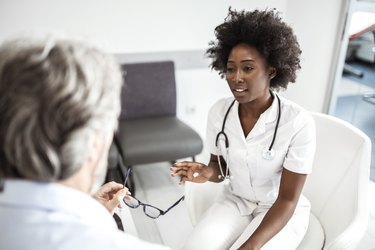
If you're looking to ace your next exam — physical exam, that is — you may be looking for tips on how to prepare, especially when it comes to what to eat (or what not to eat) beforehand. Ultimately, the nature of your checkup will determine your prep. Here's how best to prepare for your next medical exam.
Related Reading
Video of the Day
Preparation for a Medical Examination
According to Duke Health, there are a lot of good reasons for seeing your doctor once a year for an annual physical, including:
Video of the Day
- Strengthening the doctor-patient relationship
- Helping you understand your health better
- Creating a baseline for your doctor to assess from year to year
As for prep and what to know before you go, when it comes to whether or not to eat beforehand, it really depends on what you're there for, and also what you plan to eat, according to Michael Roizen, MD, chief wellness officer emeritus at the Cleveland Clinic.
When Not to Eat Before a Physical
"Whether or not you eat before a doctor's appointment really depends on what you're having done, but if you're unsure, the safe answer is to refrain from eating right before your visit," Dr. Roizen says.
"If you are scheduled to get bloodwork or certain tests or vaccines, eating beforehand could impact results," he says. "For example, eating a meal that's high in sugar or fat right before getting blood drawn could skew your glucose and triglyceride levels."
In fact, for a fasting glucose test, a LDL test or a triglycerides test, Kaiser Permanente notes you may be advised not to eat or drink anything but water for 8 to 12 hours beforehand.
Dr. Roizen says the best way to know what to do prior to a medical exam is by "always making sure to connect with your doctor's office ahead of time to know what to expect."
"Oftentimes, they'll instruct you if you need to fast," Dr. Roizen says. "If it is solely a checkup or physical exam, it's recommended to maintain your regular diet so the doctor can assess your body's typical state, energy levels and identify any irregularities or discomfort."
What to Eat for a Physical Exam
Of course, what you eat regularly affects the results of your physical as well.
Per Kaiser Permanente, the ideal diet you would want to implement and maintain for overall health and, thus, to improve the results of your physicals would focus on:
- Whole grains
- Vegetables
- Fruits
- Protein
- Low-fat dairy foods
- Limiting saturated fat and salt
If you already eat this way, Dr. Roizen says it's best to continue to do so in the days leading up to your physical.
If you do not, however, Dr. Roizen suggests not changing anything in your regular diet before your physical. This way, he says, you can provide your doctors with the best information about your health and give them the data they need to help you make changes to your diet and lifestyle.
"In order to get the best results during your physical, you should maintain your regular diet ahead of your appointment so your doctor can examine how your body feels on a normal basis and then can have a conversation about the best way to help you get healthier in the long run," he says. "Outside of eating, it's important to answer questions honestly and accurately to help inform the best path of care."
Related Reading
Tips for Successful Medical Exams
After you've had your physical, it's time to make changes to what you eat so you can see improvements before your next exam, Dr. Roizen says.
"While it may not be a secret, the key to long-term results is a consistently nutritious diet," he says. "Eating extra healthy for a few days before your appointment may help improve immediate test results, but could impair your doctor's guidance if he or she doesn't have the most accurate information."
That's why, he says, "the overall goal should be to adopt healthy eating habits and incorporate wholesome ingredients into your diet."